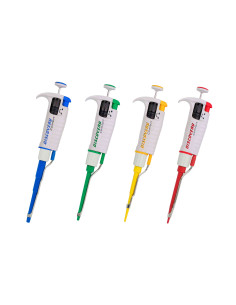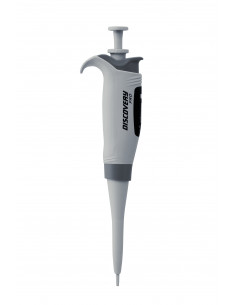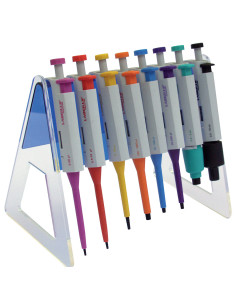MICROPIPETTES SINGLE CHANNEL
Single-Channel Micropipettes
In a laboratory, every measurement matters. Precision in liquid handling is key to obtaining reliable results in experiments, clinical analyses, and scientific procedures. That’s why single-channel micropipettes have become an essential instrument in various research and healthcare fields.
At Pobel, we offer high-quality single-channel micropipettes designed to ensure accuracy, comfort, and durability. With variable volume options and mechanical models, we help you find the best tool for your daily work.
What is a Single-Channel Micropipette?
Single-channel micropipettes are laboratory instruments designed to measure and transfer liquids with high precision on a small scale. Unlike multi-channel micropipettes, which allow multiple channels to be handled simultaneously, single-channel micropipettes have only one pipetting channel, making them ideal for individual tasks that require precise control.
These micropipettes are used in various fields, including:
- Molecular Biology and Genetics – transferring reagents in PCR experiments, DNA extraction, and cell studies.
- Chemistry and Pharmacology – preparing solutions with exact volumes.
- Clinical Analysis – handling blood samples and biological fluids in medical laboratories.
- Microbiology – working with bacterial cultures and growth media.
With their ergonomic design and high precision, single-channel micropipettes are indispensable tools in any laboratory.
Types of Single-Channel Micropipettes
There are different types of single-channel micropipettes based on their operating mechanism and volume adjustment method:
1. Mechanical or Manual Micropipettes
- Operate with a manually activated plunger.
- The most commonly used in laboratories due to their reliability and ease of use.
2. Electronic Micropipettes
- Automate the pipetting process, reducing human variability and fatigue during prolonged use.
- Ideal for high-workload laboratories.
3. Fixed-Volume Micropipettes
- Always dispense a pre-set volume, ensuring maximum precision.
- Minimize human error and simplify pipetting tasks.
4. Variable-Volume Micropipettes
- Allow volume adjustment within a specific range, offering greater versatility for different experiments and analyses.
Advantages of Using Single-Channel Micropipettes
Using single-channel micropipettes offers multiple benefits in the laboratory:
- Precision in every pipetting – Designed to ensure accuracy in liquid handling.
- Total volume control – Models with variable volume adjustment for greater flexibility.
- Ergonomic design – Reduce fatigue and improve comfort during daily tasks.
- Wide compatibility – Work with a variety of universal tips.
- Easy maintenance – Simple calibration and chemical-resistant materials.
If you need an instrument that provides maximum precision and comfort in the laboratory, a single-channel micropipette is the ideal choice.
How to Choose the Best Single-Channel Micropipette
Before purchasing a micropipette, it’s important to evaluate certain factors to ensure it meets your needs:
- Work volume – If you frequently measure the same volume, opt for a fixed-volume micropipette. If you need flexibility, choose a variable-volume model.
- Frequency of use – For intensive pipetting, an electronic micropipette can reduce manual effort and improve efficiency.
- Ergonomics – Models with an ergonomic design and easy-to-use mechanisms reduce fatigue and improve precision.
- Quality and brand – Choosing micropipettes from recognized manufacturers ensures reliability and long-term durability.
At Pobel, we provide expert guidance to help you find the perfect micropipette based on your application and budget.
Single-Channel Micropipette Maintenance and Calibration
To maintain accuracy and extend the lifespan of your micropipette, proper maintenance is essential.
Cleaning and Care Tips
- Clean the exterior with isopropyl alcohol to prevent residue buildup.
- Use high-quality disposable tips to avoid cross-contamination.
- Avoid aspirating corrosive liquids without using filter tips.
Periodic Calibration
- Check calibration every 3 to 6 months, depending on usage frequency.
- If you notice differences in dispensed volumes, recalibrate the micropipette before continuing to use it.
- Use a precision balance to verify accuracy.
At Pobel, we offer micropipettes that meet high-quality standards and calibration requirements.
Buy Single-Channel Micropipettes at Pobel
At Pobel, we offer a wide range of single-channel micropipettes from the best brands, designed to provide precision, comfort, and durability in the laboratory.
Why Choose Pobel?
- Wide variety of models – Fixed-volume, variable-volume, mechanical, and electronic micropipettes.
- Guaranteed quality – Products from recognized manufacturers in the industry.
- Expert advice – We help you find the ideal micropipette for your laboratory.
- Fast and secure shipping – Receive your order in record time.
Explore our catalog and enhance the precision of your work with a high-quality single-channel micropipette.
Have questions? Contact us, and we will provide expert guidance with no obligation.
Frequently Asked Questions
What is the difference between a single-channel and a multi-channel micropipette?
Single-channel micropipettes have one pipetting channel, while multi-channel micropipettes feature multiple channels (8 or 12), allowing for faster sample processing in microtitration plates.
How should a single-channel micropipette be cleaned?
It should be cleaned with isopropyl alcohol and kept away from corrosive liquids. It is recommended to change the tips after each use to prevent contamination.
How often should a micropipette be calibrated?
It depends on its usage, but it is recommended to calibrate it every 3 to 6 months to ensure measurement accuracy.









